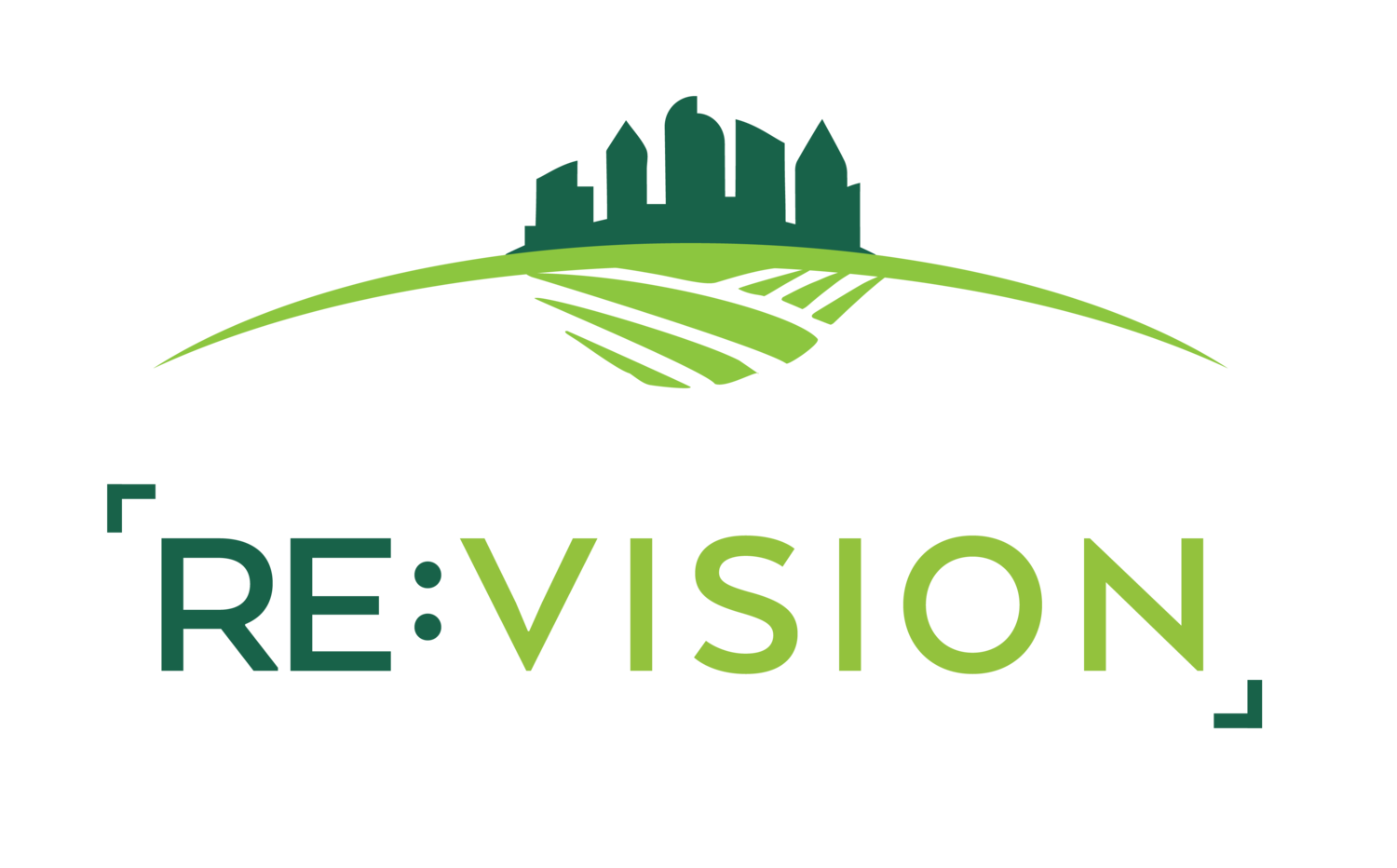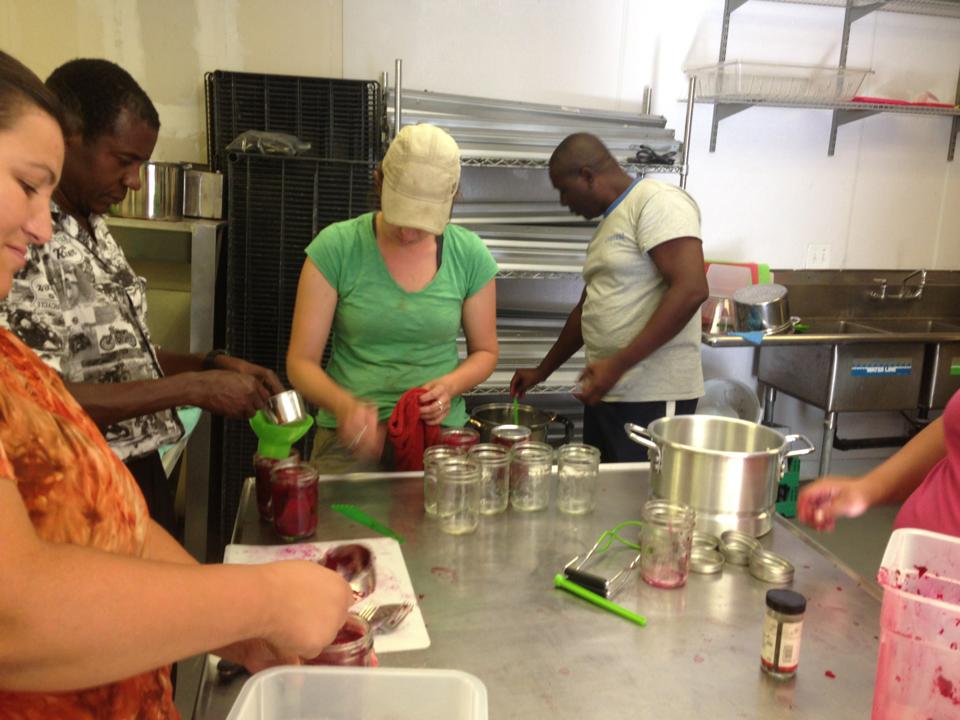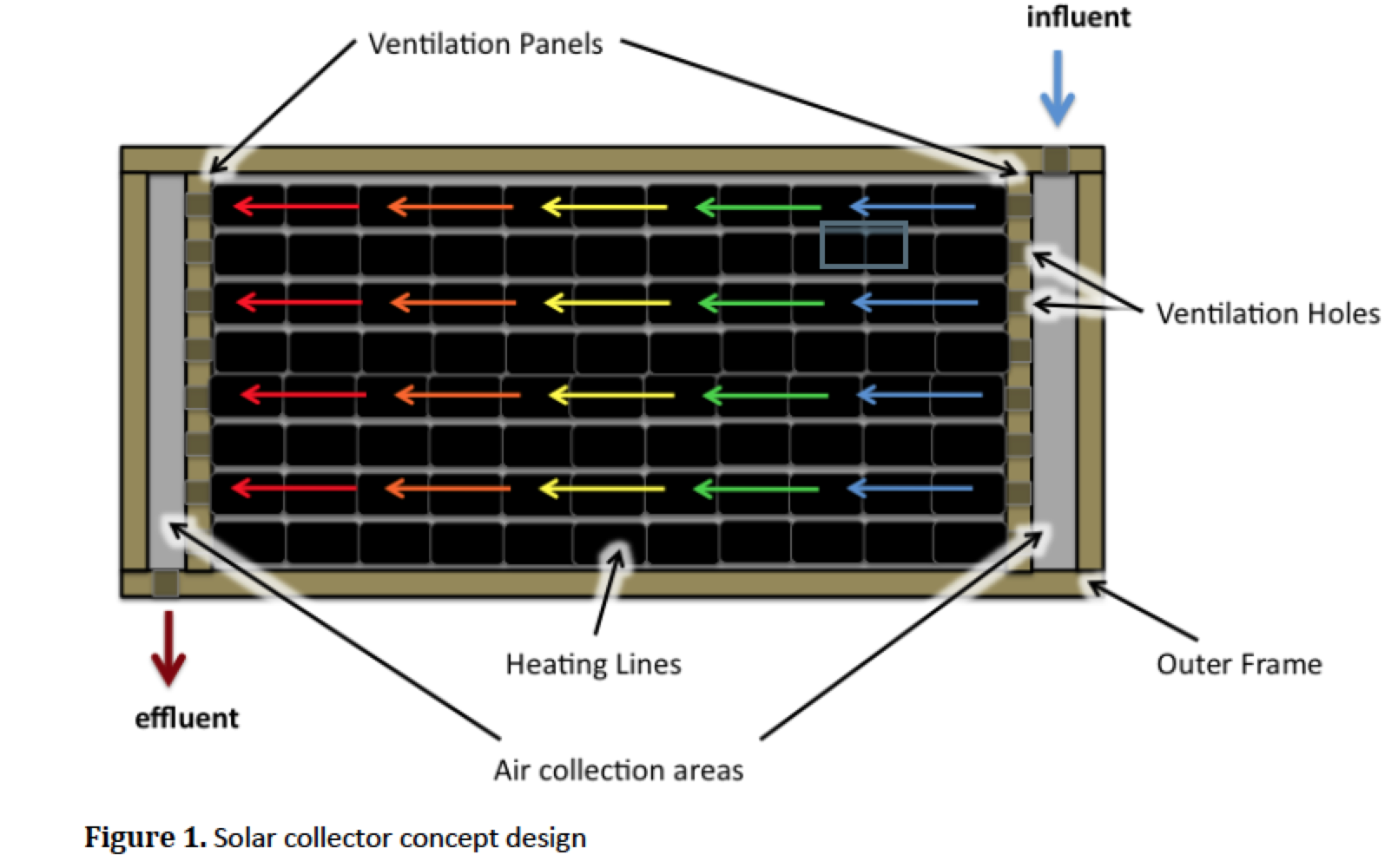
Re:Write
STORIES FROM THE FIELD, PROMOTORA RECIPES, AND CO-OP DEVELOPMENT LESSONS (PLUS SOME POLITICS AND HUMOR, TOO)
Not Adios But Hasta Luego
Do you know what is a hard thing to write?
A blog announcing to you all – my friends, my partners, and my heroes, that I am leaving Re:Vision.
Do you know what is a hard thing to write?
A blog announcing to you all – my friends, my partners, and my heroes, that I am leaving Re:Vision.
It’s hard, because I think about a conversation I had with a backyard gardening family (in my broken Spanish), who explained to me how tough it is to both hold down a job and care for their sick daughter. But when they talked about their backyard garden, they smiled because, as they explained, they could finally feed their daughter healthy, affordable food.
It’s hard because I think about what it felt like to sit in a meeting recently with Paul Washington, Denver's Director of Economic Development, and hear him say that cooperative business models are one of the best strategies for narrowing the wealth gap in Denver. I glow knowing that Re:Vision’s work is pioneering that strategy.
It’s hard because I think about when I visited 3738 Morrison Road just a couple of weeks ago - five months after Re:Vision purchased the property. Instead of the junkyard it had been for the last few decades I saw a clean property with buildings gutted. The site is ready and waiting to become the home of the Westwood Food Cooperative and a much-needed gathering space for food, health, and community enterprise. I felt immediately that Re:Vision is on to something that will transform this community and Denver.
The most difficult part is that I know Re:Vision is going through a remarkable ground-breaking growth, packed full with real substance, and I won’t be here to see it every single day. Inspired by this place and these people, I am pursuing my lifelong dream of starting my own consulting business. There will still be many opportunities to work with Re:Vision, so it’s not a goodbye - not even close.
Re:Vision has changed me, the way I look at my work, and the way I look at community planning and development in general. We must start with the people who know their own problems best. We must equip them with the tools to leverage their own resources toward sustainable solutions. This type of community development takes a tremendous amount of patience and dedication, but it works.
No one can verify this more than Eric, Joseph and Patty, three of the most dedicated people I know. Eric and Joseph believe so wholeheartedly in what they're doing, that they moved into the Westwood area to be full-time members of the community. Patty, Re:Vision’s lead promotora, spends many weekends attending quincineras and weddings of Re:Farm families - out of the goodness of her heart, not because she’s getting paid. These three heroes live, eat and breathe Re:Vision's mission every moment of every day.
Even though leaving at this time is hard, there is no question that Re:Vision will continue to soar. And whoever takes over my role will be beyond lucky to have the opportunity to fly with this organization.
I hold this one particular thought for the future near and dear, an image in my mind that I know will be a reality soon:
It’s 2017, and I am shopping in the Westwood Food Co-op with my kids. We are members. We purchase vegetables grown on site, beef raised sustainably 60 minutes away, and jelly made by Westwood residents. We wave to a couple of Promotores who are teaching a class on canning and pickling. After we finish shopping, we head outside to the public plaza. Kids are playing in the plaza, with parents chatting nearby, enjoying a beautiful day. I see Eric and Joseph and hug them. I can’t stop beaming with pride.
A Fresh Look at the Buying Club
My name is Megan and I am the Food System Coordinator at Re:Vision. I am writing to you to introduce myself, and answer any and every question that you may have about the Buying club. It's my job to deliver the best local products I can find, and to support you and the incredible community here in Westwood as we launch the food co-op!
Friends!
My name is Megan and I am the Food System Coordinator at Re:Vision. I am writing to you to introduce myself, and answer any and every question that you may have about the Buying club. It's my job to deliver the best local products I can find, and to support you and the incredible community here in Westwood as we launch the food co-op!
So let's get started...what is the Buying Club exactly? And why do we keep telling you to sign up?!
The Buying Club is a program where you can purchase local specialty items (like yogurt, cheese, and eggs!) online, and your order helps us offer the same food at low cost in Denver's food deserts. We want you to sign up, because in YOU - our friends and partners and members - we are laying the foundation for the coop. That's right. The Buying Club helps us establish our producer and distribution channels, and build a client base. That's the big picture. And in supporting the buying club, you are also helping us build these food systems for Westwood. It's very cool, and I am excited to have you become a part of it. So, in summary, by joining the Buying Club...
- You have access to a unique variety of locally sourced meats, dairy, eggs, and more.
- Your purchase gives the Westwood community the option to purchase healthier food for their families.
- You help strengthen the local food system as you encourage your own community to shop responsibly.
- You are the building-block to help successfully launch and sustain the Westwood Food Co-op.
Want to help us build it? Tell us the kind of products that YOU would like to see!
Take two minutes to fill our our product survey here, and not only will you receive a code to get 10% off of your next order, but I personally will take all of your answers and do my best to go out and get the products that you want to see featured in the buying club!
Here are five NEW products that I'm excited about, and my new favorite recipe!
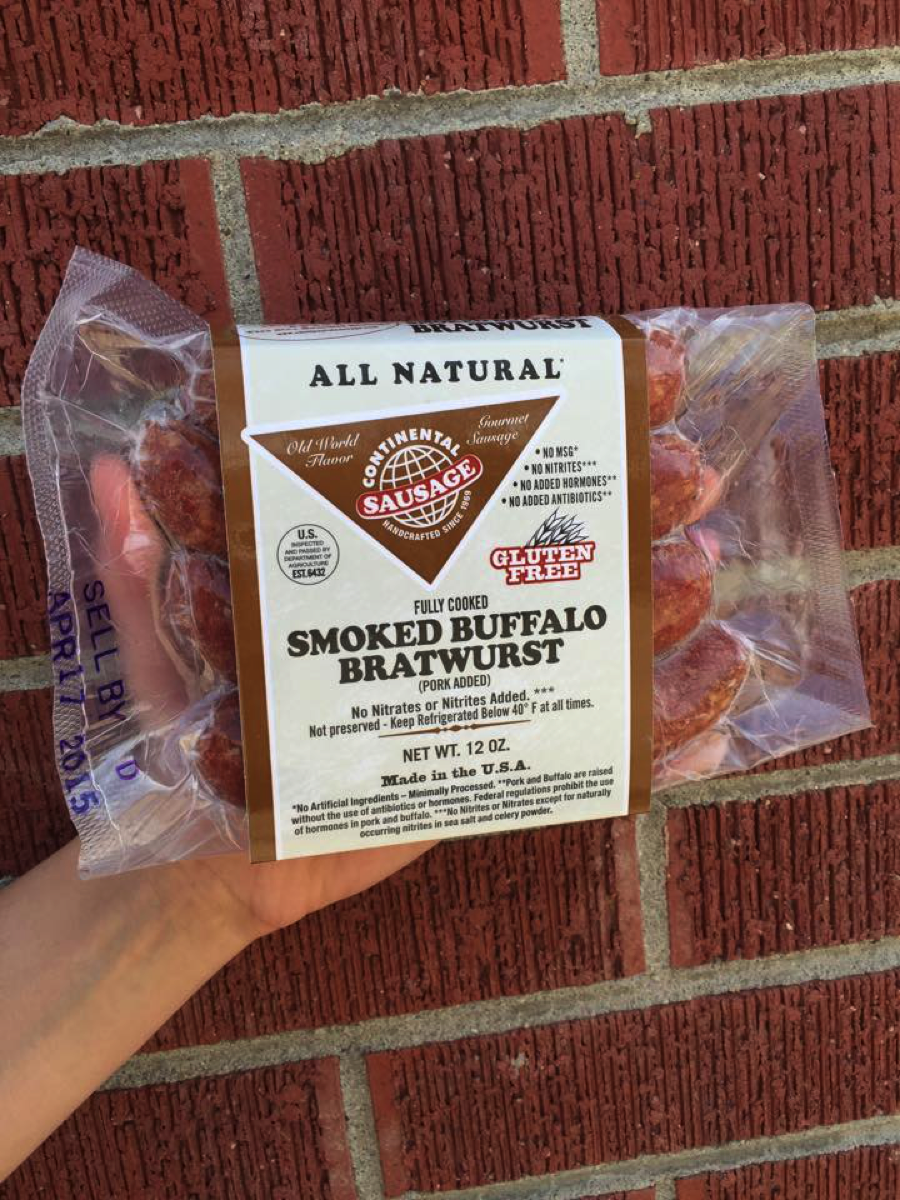

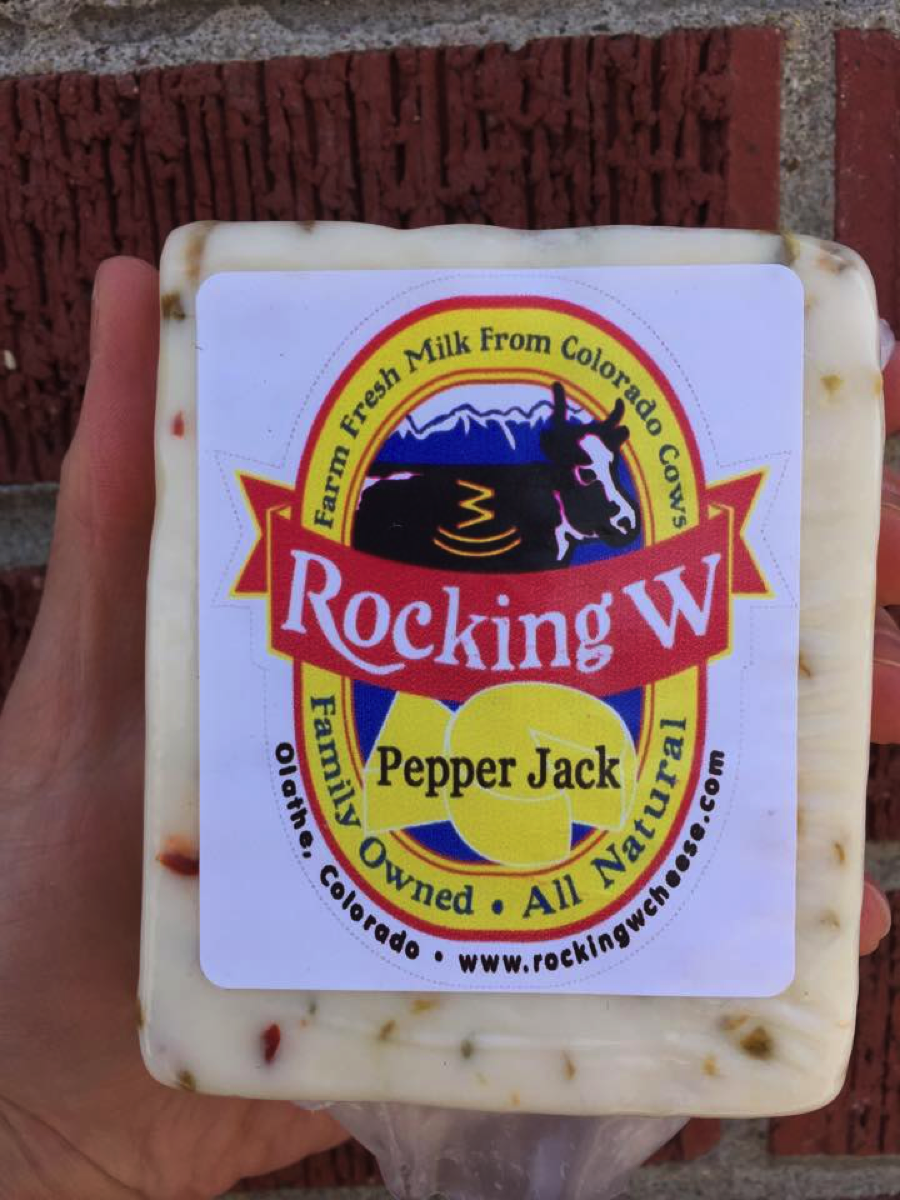

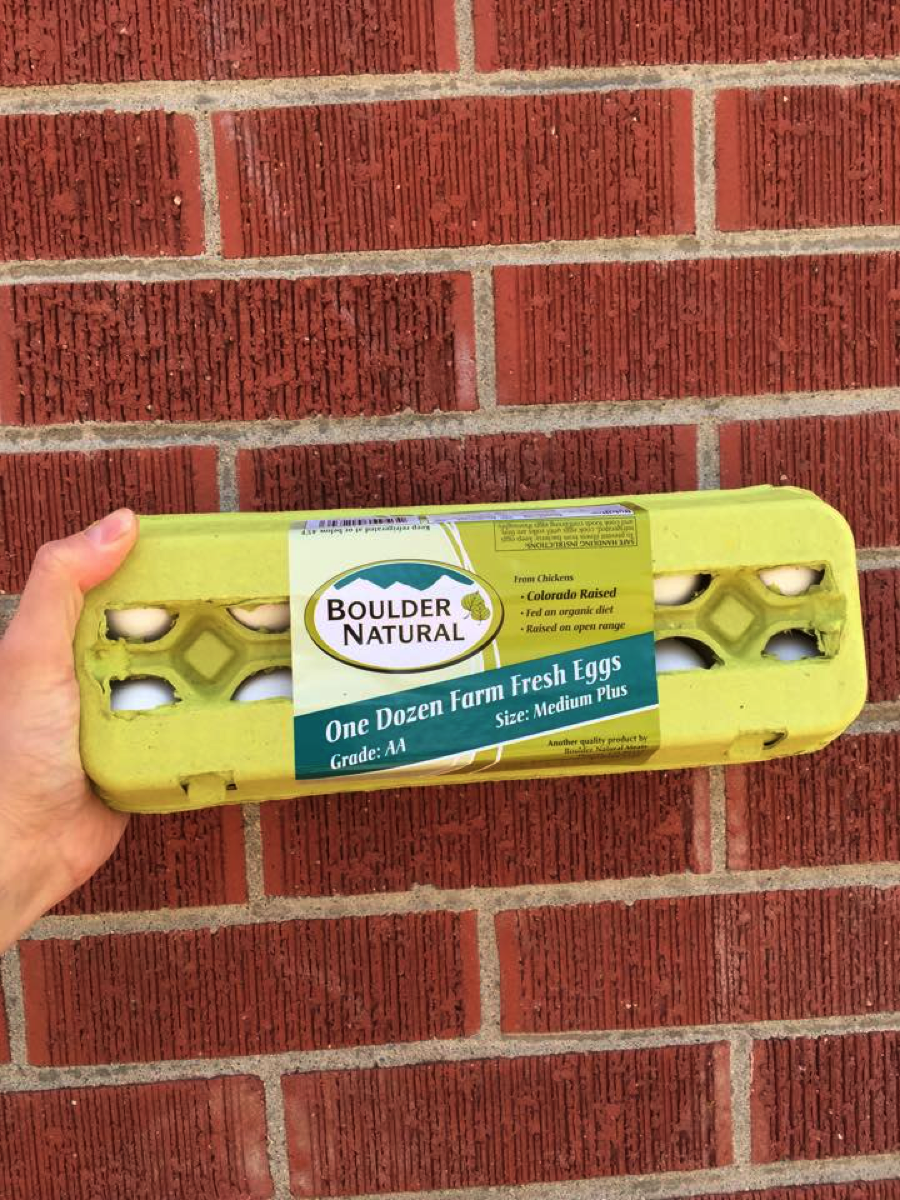
Smoked Buffalo Frittata
Makes 8 servings
Ingredients:
12 Boulder Natural Eggs
½ c. whole milk
¾ c. Rocking W White Cheddar or Pepper Jack
Salt & Pepper
2 Tablespoons Royal Crest Butter
½ medium onion, chopped
½ lb. Continental Bison Bratwurst links, casings removed
1 ½ - 2 c. local vegetable of choice
Directions:
Preheat broiler. Whisk eggs and milk in a medium bowl. Mix in ½ c. cheese and season with salt and pepper. Set aside.
Heat butter in large skillet, preferable cast iron, over medium heat. Add onion and chorizo and cook until sausage is brown, 6-8 min. Add vegetable of choice; season with salt and pepper, and cook until vegetables are tender.
Reduce heat to low and pour egg mixture over vegetables. Cook, shaking pan occasionally, until edges are just set, 10-12 min. Top frittata w/ remaining ¼ c. cheddar; broil until top is golden and center is set, about 4 min longer.
Serve for breakfast, lunch, or dinner with a green salad!
Thanks for reading! If you would like these kinds of updated delivered to your inbox weekly, don't forget to sign up for the Buying Club, it's free!
A Virtual Grocery Store Feeds A Food Desert
I remember when I was ten-years-old, I looked through the pantry, and bemoaned “Mom, why can’t we have sugar cereal like everyone else?” My mom’s commitment to eating healthy was by no means cool when all I wanted to eat was Lucky Charms and fast food.
“Mom, why can’t we have sugar cereal like everyone else?”
“Someday you’ll understand and care about what you put in your body.”
This was an average conversation with my mother as a child. Her commitment to eating healthy interfered with my dream of a bowl of Lucky Charms in my lap while watching Saturday morning cartoons, followed by a happy meal for lunch.
When I was finally able to shop for myself, I unleashed all the years of pent-up hunger for sugary cereals, sodas, and processed foods. However, it was a short-lived affair as I quickly recoiled from the way my new diet made me feel…
Sluggish. Bloated. Tired. Restless. Agitated.
I soon found myself shopping at the same health food stores that previously embarrassed me – the ones that I would get dragged into while kicking and screaming. With echoes of my mom’s voice in the back of my mind, I quickly eliminated processed foods again and started shopping for fresh, organic produce like she taught me.
The problem was, I realized that I couldn’t really afford it.
While on an average shopping trip, it dawned on me: if this was difficult for me – a young college student with a decent paying job and very few bills – how could families who were struggling to make ends meet shop for healthy foods? This realization was one of the many big sparks that led to the passion of Re:Vision. I soon had a growing desire to make sure that everyone has the right to eat healthy food that they can afford.
I live in Barnum. When I moved in, I was immediately immersed in the day-to-day struggle of my neighbors to eat healthy. With next to no options for a grocery store nearby, I found myself trekking up to 15 minutes to the nearest Whole Foods Market. I again found myself thinking about the majority of the families in my neighborhood – I was privileged to have the means to get to the grocery store of my choosing, and the financial means to purchase the freshest and healthiest foods available. This made my grocery bags feel even heavier each time I unloaded them from my car.
At this point, Re:Vision had started over 168 gardens in the surrounding area, and families were eating healthier. But it wasn’t enough. We needed to have a healthy grocery store that was accessible and affordable. That, however, was not feasible without millions of dollars. And that would be years away.
Thinking back to my childhood, I remembered that my mom bought meat from a local farmer through an organic buying club. We bought a lot up front and it lasted the year, which cost far less than shopping at the store. Best of all, there was no store - we picked it up from a nearby family’s house. Soon, the idea of a ‘virtual grocery store’ in our neighborhood started to make sense to me. As long as there were convenient locations to pick-up, and an easy way to order and pay, why couldn’t it work?
It wasn’t the grocery store the community needed, it was the groceries.
In late 2014, Re:Vision began building relationships with local farmers, food producers, and distributors. By purchasing bulk orders and warehousing the items, we are able to buy at wholesale prices, and because we don’t have all the overhead costs of a traditional brick and mortar grocery store, we can pass the savings on to our customers.
This model of ordering can help increase the access and affordability to the healthiest food for families in a community that stands to benefit the most.
Our efforts have provided a lot of opportunities for learning: the relationship between farmers, producers and consumers is often convoluted with too many people in the middle. People’s shopping habits are hard to break (or change). Running a food business is not for the faint at heart. The best intentions to source local can sometimes go under. Despite all of the challenges in building a food system that benefits both farmer and consumer, Re:Vision remains steadfast in its belief that everyone has the right to healthy food. We strive to develop innovative models that are led by communities and work for communities.
I am happy to say that our Buying Club has re-launched with a new online platform that showcases the best food you can find from local farmers and producers. We’re starting small, but it’s a giant leap forward in a community that doesn’t have a grocery store.
My reflections on how lucky I was to grow up with healthy food - and how that has set me up for success as an adult - motivate me to provide that opportunity for the children of Westwood, where they suffer from the highest rate of childhood obesity in the city.
I hope that you, too, can take a moment to reflect on your relationship with food.
If you want to eat healthier, Re:Vision’s Buying Club is a great place to start. And if you have had the privilege of eating healthy, then I hope it will motivate you to become a supporting member, geared with the knowledge that your participation supports others less fortunate to have the same opportunities.
If you would like to sign up now (and get your $35 membership fee waived!) here are 3 Easy Steps:
- Visit our online store
- Click "Request an Account"
- Browse the variety of natural, organic and local meats, dairy and grains that we have carefully selected from Colorado producers.
Re:Vision's 7th Birthday & A Big Announcement!
Wow, how time flies! Today we celebrate our 7th birthday AND a $1.2M grant! We are one step closer bringing the Westwood Food Cooperative to fruition, and we couldn't have done it without YOU.
Seven years ago, I sat in my favorite coffee shop (Kaladi Bros near DU), highly caffeinated but perhaps more jittery by the excitement of the moment. My college friend, Joseph Teipel, and I were signing the paperwork to incorporate Revision International with the state of Colorado.
We were young - I was 25 and Joseph only 21 - and we had no business starting, well, a business. Coming out of college we both wanted our life's work to make a difference in the world.
But how?
Not seeing an organization that we wanted to work for, and not wanting to accept another unpaid internship, we did the logical thing - we started a nonprofit that represented our ideals and we set out to conquer the world! Failure seemed almost inevitable as we had no money and no idea of how to run an organization. However, both of us embraced that we would make mistakes along the way. If we failed, we’d at least gain some valuable experience, right?
Today I am pinching myself at the realization that it is our 7th birthday - what an incredible experience it has been!
What began as a dream and an aspiration to create a new model of community development has slowly become a reality. Looking forward we see that we have a long way to go. But looking backwards at how far we’ve come, I am proud yet humbled by the journey.
It is with great excitement that today, on Re:Vision’s 7th birthday, we officially announce our biggest news to date - the City of Denver’s Office of Economic Development has awarded Re:Vision a $1.2M grant to acquire property for the future home of the Westwood Food Cooperative!
The Westwood Food Cooperative, located on Morrison Road, will be the first food cooperative in the country that vertically integrates low-income, urban food producers with value-added food processing and a retail food outlet. This community wealth building approach is truly unique as it creates a for-profit business, owned by the people growing the food, and then shares profits with the community it serves. Read more about it here.
Future site of the Westwood Food Cooperative Grocery Store, Food Hub & Commercial Kitchen
You may have also recently noted our new logo. Earlier this year we went through a rebranding to emphasize the place-based community work of our organization. We decided to part ways with the International aspect (really it was in name only) and dig our roots deep into the Westwood and southwest Denver communities. Our new brand represents our evolution and maturation as an organization, reinforcing a bold vision on the horizon that is rooted in the most humbling element of all, the soil.
Over seven years we’ve have had many successes but also many failures too. At the end of the day, we are slowly making strides to turn around one of Denver’s most underserved communities and transform it into a model of health, self-sufficiency and resiliency.
Having been embedded in every step on this journey over the past seven years, I sometimes find myself looking down at my feet on the trail instead of looking up and appreciating the scenery. Today is a good reminder to be thankful of all the people that have helped Re:Vision along the way - donors, volunteers, friends, mentors, supporters, community members, board members, staff, interns, partners, even those people with whom we’ve had disagreements. It’s also a good reminder to stop once in awhile and celebrate.
Cheers!
Eric Kornacki, Executive Director and Co-Founder
Zip Code Blues
While many people are turning to genetics to learn more about their health and propensity for disease, a growing field of study shows that your zip code is equally - if not more - important.
Does where you live determine how long you will live? There’s no doubt about it. Research by the Center for Disease Control (CDC) and more locally, from the Colorado Department of Public Health and Environment (CDPHE) confirm that yes - the life expectancy of one county or zip code to the next can differ by years, or even decades. For instance, life expectancy in Denver County is 5 years less than the Colorado average. Disparities among Denver neighborhoods are even more shocking - here in Westwood and surrounding neighborhoods, for example, people live on average 12 fewer years than the Denver average of 75 years.
This concept has been the topic of discussion in many public health forums recently. From op eds in the Denver Post by Colorado Health Foundation president and CEO Ann Warhover, to a presentation by The California Endowment’s Dr. Iton at a Health Equity Learning Series event sponsored by The Colorado Trust, public health experts are actively examining why this unsettling trend is occurring and what to do about it. (If you are into slam poetry, you might prefer to listen to Clint Smith’s chilling description of life expectancy in his own Washington, DC zip code.)
The fact is, policies and politics shape neighborhood resources. Your neighborhood may have plentiful resources – a variety of homes that people can afford, good schools, parks, safe streets and grocery stores. In places where policies and politics don’t benefit the community, sometimes just a few blocks away, neighborhood amenities are sparse, inadequate and substandard. Per Dr. Iton’s argument, living with few resources causes a cycle of unsafe or undesirable living conditions, stress, poor lifestyle choices, and chronic disease - ultimately resulting in early death.
In partnership with organizations like The Colorado Health Foundation and LiveWell Westwood, Re:Vision has been helping residents in food desert neighborhoods of Southwest Denver work to solve their “zip code blues” by inspiring residents to take the lead in advocating for their community’s health and by teaching families how to grow their own food. As a result of our Re:Farm program, thousands of low-income Denver residents have improved their access to healthy foods as well as their relationship with food. Re:Farm participants claim that they not only eat healthier, but also, overall, feel better about their futures.
This past spring, Re:Vision became one of The Colorado Trust’s 34 Health Equity Advocacy grant recipients. We have spent the summer convening regularly with the Trust and other grantees to discuss this very zip code issue, and how we might build a stronger collective “field” of health equity advocates to better shape public policies that support healthier communities. Re:Vision is proud to work with the diverse organizations at the table to help promote the Colorado Trust’s mission of advancing the health and well-being of the people of Colorado. Stay tuned for additional posts related to Health Equity Advocacy as we advance through this process. We hope to share the wisdom we have gained and keep the discussion flowing...
100 New Friends in Celebration of Spring
This spring, become a Friend of Re:Vision and help provide critical year-round support for our vital programs. Your gift will be matched 100% up to $10,000. Plus, all new donors will be entered to win a GoPro3 Camera!
In many cultures worldwide, springtime traditions and festivals (e.g. Easter, Passover, India’s Festival of Colors, even Chinese New Year) are rooted in agrarian societies’ celebrations surrounding a new growing season. For urban farmers and backyard gardeners, each May begins a new year – a joyous time of digging, compost, dirt under fingernails, planting seedlings, and most of all hope. Hope that each new sprout poking through the soil will turn into something yummy, beautiful and nutritious.
Friends of Re:Vision are our monthly supporters. They are the lifeblood of our organization, because they provide us with dependable year-round support for our vital programming. Becoming a Friend of Re:Vision is easy – simply make a monthly contribution of $10 or more.
This May we have set a goal of attracting 100 new Friends of Re:Vision. And now - the top five reasons why you should help us meet this goal.
NUMBER FIVE. Denver, like many American urban cities, suffers from major health disparities - most notably in poor communities and communities of color. Your gift will support Re:Farm Denver, Re:Vision’s flagship program, that teaches low-income families how to grow their own food. With your gift, you will expose thousands of people in marginalized neighborhoods to the many benefits of eating healthy, community- grown produce.
NUMBER FOUR. You care deeply about supporting the local economy, building a sustainable city with equitable opportunities for all its residents, and creating healthy neighborhoods. Join the many respected organizations that have done their research and chosen to support Re:Vision in these very efforts: the Colorado Health Foundation, The Denver Foundation, USDA, Slow Money, The Colorado Trust, the Anschutz Family Foundation, and more.
NUMBER THREE. Re:Vision recently helped community members incorporate the Westwood Food Cooperative (WFC) – Denver’s first community-owned food cooperative and one of the first in the nation that sources produce from small-scale urban farmers in low income neighborhoods. By supporting Re:Vision and the WFC, your gift puts healthy food on the plates and extra income in the pockets of the people who need it most.
NUMBER TWO. All Friends of Re:Vision as of June 1, 2014 will be entered to win a GoPro HERO3+ camera. And who doesn’t want a GoPro?
NUMBER ONE. Every dollar you commit to donating in May 2014 will be matched 100% by a generous gift from the Parmar Family and Ardas Family Medicine, up to $10,000!
Don’t miss out on this chance to double your donation and your impact on the community.
Don’t miss out on your chance to win a GoPro Camera!
Become a Friend of Re:Vision today!
300 Backyard Gardens Underway in SW Denver!
It's growing season! Re:Vision has signed up 300 families in SW Denver to participate in it's Re:Farm Denver program. This is up from 200 families in 2013!
Here’s to spring in Colorado – where a single day can include t-shirt temperatures, sunglasses, a blizzard and even thunder snow! In the midst of all the wacky weather, Re:Vision’s promotoras and other community members are hard at work starting the sixth growing season (6 years!!) of Re:Farm Denver’s backyard garden program in southwest Denver.
We’re excited to announce that 300 low-income families have signed up for backyard gardens through our program this year! We want to take a moment to thank the Colorado Health Foundation and the Roots and Branches Foundation (Rose Community) for their support of the Re:Farm program, allowing us to expand the number of families who can experience the many health and economic benefits of growing their own fresh produce in their backyards.
Promotor Christobal Rodriguez demonstrating how to plant peppers.
Like many low-income urban communities, Westwood residents have very few choices for healthy food. Our Re:Farm program teaches families how to grow food right in their backyard. However, we know that simply helping a family start a garden isn’t a guarantee that they will change their eating habits and/or improve their health. Access is important, but without education and motivation, nothing will change. That’s why our Re:Farm program pairs each family with a promotora who is trained in gardening and in health. We train and employ residents from the community and match them with their neighbors, thus building the leadership, knowledge base, and relationships that make each neighborhood healthier, self-sufficient, and more resilient!
Promotoras delivering compost to a family garden.
Promotoras have finished delivering organic bio-compost to each household garden, and are helping families rototill their yard, breaking up the tough Denver clay into healthy, lush soil. Now we’re keeping our eye on the forecast for sunny days on which we can begin planting seeds. And just a few weeks from now, promotoras will deliver seedlings from Re:Vision’s greenhouse and help families plant tomatoes, chilies, squash, melons, and other summer delights! Later in the summer when families are harvesting their hard-earned bounty, promotoras will help lead cooking classes and workshops in Re:Vision’s new educational kitchen!
Interested in getting involved? Help more families participate in Re:Farm by donating now, by purchasing a CSA share, or by taking advantage of Revision’s Dig it Forward custom veggie garden design and installation services.
Already have a garden? Make your annual garden dollars go further by getting all your seeds, plants, soil amendments, and custom drip irrigation needs met at our Re:Seedling sales!
Launch of the Westwood Food Cooperative!
Re:Vision is excited to announce the launch of Denver's first food cooperative, the Westwood Food Coopertive!
Over the past five years, Re:Vision’s Re:Farm Denver program has laid the groundwork for a strong community food system in southwest Denver – over 300 low-income families producing food in their yards, converting two vacant properties into highly productive urban farms, distributing countless tons of fresh, organically grown fruits and veggies, and offering numerous cooking and nutrition classes.
Today, we are extremely excited to announce a milestone that makes it a community-owned food system: the incorporation and launch of the Westwood Food Cooperative (WFC), the first food cooperative in Denver, and one of the first in the country to be owned and operated by residents of a low-income community. (Actually, there was a food co-op that opened in Denver in 1976 called the Common Market but it closed in 1980.)
What is a food cooperative? Food cooperatives typically offer healthy and natural foods, many starting as local buying clubs. However, rather than being owned by a large national retailer based in another state (as most Denver grocery stores are), a cooperative is owned by its members - the community of people who shop there and receive all of the benefits!
Big plans are underway for the WFC, with the vision of opening a community-owned grocery store and food hub in Westwood, a community where you cannot find healthy food. The WFC will allow residents to sell their surplus produce at the grocery store. Any resident of the community can become a member of the WFC, meaning that when you shop at the co-op, you might buy your neighbor’s produce, or see your neighbor working there. Members get to vote on substantial business members, elect their neighbors to serve on the board of directors, and at the end of the year, profits are distributed back to the members!
Additionally, the WFC aims to launch a commercial kitchen facility that will use produce grown in the neighborhood, and train people how to create value-added food products, like salsas, prepared meals and other items that can be sold through the retail store. Walking into the grocery store, you’re likely to see the shelves stocked with quality products created by local residents and sold under the co-op brand label!
Another business opportunity for the WFC is to operate a small food hub that aggregates, washes and processes, stores and packages, and distributes food grown by Re:Vision’s family farmers, as well as other local and regional farmers. The food hub will conveniently provide quality locally-grown food products to restaurants, schools, churches, and other institutions.
Community members electing representatives to serve on the board of directors.
Through the WFC, Re:Vision is showing what place-based economic models look like. This is a business that exists to serve the needs of a specific community, and therefore can never be uprooted and outsourced somewhere else. Several weeks ago, the community elected its first board of directors: two members from the backyard gardeners, promotoras, Somali Bantu, Re:Vision and one representative of the neighborhood coalition Westwood Unidos.
Want to get involved? We have several seedling sales this spring, along with CSA shares this summer. And stay tuned over the coming year as we’ll keep you updated the co-op acquires a site, launches a crowd-funding capital campaign, and begins offering membership!
Here's a great little video to inspire you to join this movement!
A Bun in the Oven: ReVision's Educational Community Kitchen
Construction is underway on Re:Vision's educational kitchen in Westwood. The kitchen will hold classes and workshops for families wanting to learn how to cook from their garden and to eat a healthier diet. Workshops on food preservation and starting a food-related business will also be offered!
Our "kitchen" space last year during canning season!
Two years ago, when Re:Vision leased an old restaurant building on Morrison Road as our office space, an idea started brewing in our minds - to transform the back storage room into a community kitchen.
As participation in Re:Vision’s backyard garden program grew, our Morrison Road offices have become a make-shift community center. Residents and partners visit regularly for meetings, trainings and community celebrations. Unfortunately, we’ve had to leave the neighborhood to teach people how to cook the food they’ve been growing in their gardens, as no commercial kitchen facilities exist in Westwood that are open for community use.
And all the while, the idea of building our own commercial kitchen kept simmering on the back burner.
The construction begins!
In late 2012, after stewing on this idea and discussing it with the community, a vision emerged. Community members asked for a place where they can gain cooking skills, knowledge about healthy eating, and of course, share food and recipes. Many want to learn how to cook healthy meals using fresh produce from their garden. And most importantly, they wanted a gathering place where local food culture can steep until its full flavors emerge, using the wisdom of the community as its foundation. Finally – the kitchen will be an incubator helping would-be entrepreneurs to get their food-based businesses off the ground and running.
A recipe had been formed. Then, in 2013, all the ingredients began coming together.
The exhaust hood provided by our landlord about to go up...
Several generous foundations, including the Sparkplug Foundation, the Jane Musser Fund, Westwood Unidos and the USDA, gave grants. Plans were drawn up, contractors were hired, and papers were filed with the building department. Then more papers. And more. Then waiting. And more waiting. Then finally, our plans were approved!
Today, we are excited to announce that work is underway! The exhaust hood and fan have been installed, electrical work is nearly complete, and the cabinetry and learning stations are just around the corner. Re:Vision’s Educational Community Kitchen is taking shape - you can almost smell it!
Stay tuned – we’ll keep posting blogs here as the project moves forward. Want to get involved in this exciting project? Donate now or check out our in-kind needs page here.
EZ Heat Solar Furnaces
Revision, in partnership with professor Aaron Brown at Metro State, have developed a soda-can solar furnace that costs less than $40 to make, and can help a family save $30/month on their heating bills.
An energy kit Revision provided for low-income families.
Driving through the Westwood neighborhood, you’ll notice something you see in many lower-income neighborhoods – evidence of poor housing stock, like cheap single pane windows, inadequate siding, and frequently, additions that aren’t up to code. For many families in this neighborhood, the winter months are a dreaded battle to remain warm. Poor insulation and weatherization mean their houses struggle to retain heat. The cost of keeping the house livable can reach $200 or more, and many families simply cannot afford this.
In 2011, Revision won a grant from the Denver Energy Challenge to help low-income families reduce the energy usage to heat and cool their homes. Tapping into it’s extensive community-network in Westwood and southwest Denver, Revision conducted over 200 home energy audits, providing those families with an energy efficiency kit and resources on how to weatherize and insulate their homes. However, after 18 months, it was obvious that the program was not meeting the needs of low-income residents. Energy audits simply gave them a list of things to fix on their house that were too expensive, and the energy-saving kits didn’t make a big enough impact – it was like bailing out a leaky boat with your hands.
An early prototype of the solar furnace. This iteration cost approximately $80 and has 144 cans.
Enter a unique collaboration between Revision and Metro State University of Denver’s Aaron Brown, an assistant Professor of mechanical engineering. Aaron’s passion for engineering and appropriate technology in impoverished communities led him take on the issue of heating houses in Westwood. Could he come up with a solution that would help heat a home and be affordable? The result was a simple prototype: a soda-can solar furnace that costs less than $40 to build, and utilizes reclaimed resources. Dubbed “EZ Heat” by residents, these solar furnaces take air from inside the house, funnel it through a passive-solar configuration of soda pop cans painted black, and pump it back in the house. The solar gain increases the air temperature over 100 degrees, all while only using a tiny computer fan to move the air, costing less than 2 cents per day to run. The furnaces are expected to save an average of $30 per month during the winter!
Thanks to Aaron’s vision, the dedication of his students, and the work of Revision promotoras to sell the idea to the community, four low-income families have prototype furnaces installed on their homes!
Over the next several months, the furnaces will be monitored and each family’s energy bills will be examined to calculate savings. Additionally, Aaron will train Revision’s promotoras on how to build the furnaces with the goal of creating a small community-based business employing residents to build them to sell for the neighborhood.
Interested in buying a furnace? Email us to put your name on the waiting list. Want to help make this and other community efforts a reality? Donate to Revision and know your dollars are heating up change in the lives of low-income families and communities.
